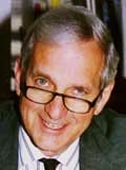The Way We Work
Surgeon c. 1300, from Anglo-Fr. surgien, from L. chirurgia, from Gk. kheirourgos "working or done by hand." from Online Etymology Dictionary.

Martin McKneally
|
In an entertaining new book
published this month (Shop
Class as Soulcraft: An Inquiry Into
the Value of Work, Penguin Press,
2009) motorcycle mechanic and
political philosopher Matthew
Crawford explains the elemental
satisfaction derived from working
with our hands. He contrasts
the experience of individual
agency he derives from repairing
motorcycles with the diffuse and unfocused rewards
of his life as a doctoral level "knowledge worker". The
dominant educational paradigm of recent decades trains
students to sit for 17 years in class and before their computers
to graduate into their cubicles. Crawford writes,
"As I was shown to my cubicle, I felt a real sense of being
honoured. It seemed more than spacious enough. It was
my desk where I would think my thoughts, my unique
contribution to a common enterprise in a real company
with hundreds of employees. The regularity of the
cubicles made me feel I had found a place in the order of
things. I was to be a knowledge worker."
Though high school shop class programs had been
widely dismantled over the past several decades, Crawford
found part time work in an apprentice role as an auto
mechanic and an electrician. He came to an epiphany
when he realized that his doctoral level of knowledge
work was being used to reverse engineer foregone conclusions
and claims to contrived premises in commercial
companies and government agencies. He began to teach
himself the deeply thoughtful and remarkably satisfying
art of motorcycle repair. He came to prize the elemental
difference as each repair job had consequences that were
close, unmediated, and associated with direct and honest
confrontation with customer-owners whose satisfaction
and gratitude gave him a deep sense of personal significance.
He enriched his knowledge and skill by entering a
network of motorcycle antiquarians who understood the
nuanced metallurgy and manufacturing idiosyncracies of
particular models and years. He came to understand the
difference between the structured role-based systematic
knowledge imparted in factory service manuals and the
perversity and risks of working on old machines. "So you
put the manual away and consider the facts before you.
You do this because ultimately you are responsible to the
motorcycle and its owner, not to some procedure. The
gap between theory and practice stretches out in front
of you .... What you need now is the kind of judgement
that arises only from experience; hunches rather than
rules. For me, at least, there is more real thinking going
on in the bike shop than there was in the think tank."
|
Surgeons and other practitioners of the manual arts
will enjoy this thoughtful book available at amazon.ca
at $20.48. It offers pleasant summer reading and may
inspire educators to revise their curricula toward more
emphasis on the value of working with material reality
as grounding for knowledge workers. The abstract and
relatively unaccountable work of many fund managers
and corporate officers in the financial world is only one
of many high-risk placements of knowledge workers.
Politicians, generals and CEOs who are insulated from
the consequences and personal accounting of their work
should be grounded in their early education with the
experience of failure. Basic lessons are learned when
we work in the concrete material reality of making and
planting things. "The visceral experience of failure seems
to have been edited out of the career trajectories of gifted
students. It stands to reason then, that those who end
up making big decisions that affect all of us don't seem
to have much sense of their own fallibility and of how
badly things can go wrong, even with the best intentions
... Those who sit on the swivel chairs tend to live remote
from the consequences of the decisions they make. Why
not encourage gifted students to learn a trade, if only in
the summers, so that their fingers will be crushed once
or twice before they go on to run the country." Like
our surgeon-scholars, Crawford personifies a refutation
of the misconception that handworkers are self-selected
because of their inability to do knowledge work. He is a
fellow at the Institute for Advanced Studies in Culture at
the University of Virginia.
As our medical curriculum undergoes its latest revision,
we should encourage medical students and practitioners
to enjoy and learn from the visceral experience of delivering a baby, suturing a wound, casting a fracture.
"There is good reason to suppose that responsibility has
to be installed in the foundation of your mental equipment
at the level of perception and habit. There is an
ethic of paying attention that develops ... through hard
experience. It inflects your perception of the world and
your habitual responses to it. This is due to the immediate
feedback you get from material objects and to the
fact that work is typically situated in face-to-face interactions."
I wish you all a happy summer, tending your
garden or repairing your dock.
Martin McKneally
|